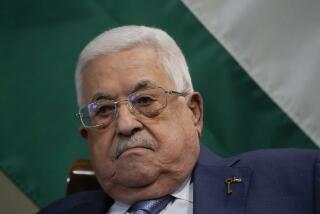Fighting Terror Tops Jordan Premier Agenda
- Share via
AMMAN, Jordan — Jordan’s new prime minister denied that this month’s triple hotel bombings in Amman were the reason for a major reshuffling of the kingdom’s government, according to remarks published Saturday.
But Marouf al-Bakhit, who was appointed Thursday, vowed that fighting terrorism and implementing reforms would top his agenda, saying Jordan “must replace the culture of extremism with that of tolerance.”
King Abdullah II appointed al-Bakhit with a mandate to form a new government and launch an all-out war on Islamic militancy in the wake of the Nov. 9 suicide bombings that killed 63 people, including the three Iraqi bombers, and wounded hundreds.
Al-Qaida in Iraq, led by Jordanian-born militant Abu Musab al-Zarqawi, claimed responsibility for the attacks.
“The reform process is not related to the bombings but unfortunately it coincided with them,” al-Bakhit said in comments published in the semi-independent ad-Dustour daily. “We have to deal with the current challenges reasonably and realistically.”
Al-Bakhit said “fighting poverty and unemployment” would be key to tackling extremism and building tolerance, adding the government would focus on mosques, schools and the media to reach the general public.
Al-Bakhit, who was Jordan’s ambassador to Israel until being appointed head of the national security council six days after the bombings, is holding consultations with parliamentary leaders to form a new Cabinet, which he promised would be “close to the people, to the street.”
Before the bombings, many Jordanians sympathized with militant attacks on U.S. forces in Iraq because they considered America’s policy in the Middle East biased in Israel’s favor and bent on controlling Arab oil wealth.
But in a clear shift, angry Jordanians took to the streets to denounce al-Zarqawi following the blasts, which killed mostly Jordanian Muslims.
* __
Associated Press reporter Shafika Mattar contributed to this report.
More to Read
Sign up for Essential California
The most important California stories and recommendations in your inbox every morning.
You may occasionally receive promotional content from the Los Angeles Times.













